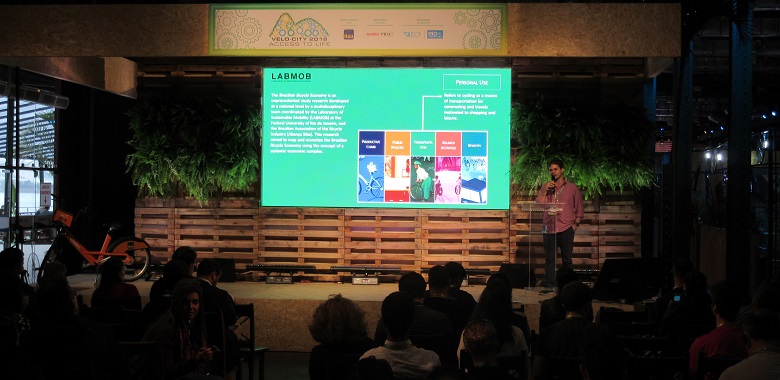
Velo-city day 3: Bikenomics session
The session on cycling and the economy brought together contributions that took a global view on the economic benefits of cycling, with concrete examples and case studies.
In his introductory presentation, Holger Haubold from the European Cyclists’ Federation presented the results of the EU Cycling Economy report from 2016, the ECF study on the job creation potential of cycling, as well as several other studies focusing on specific benefits of cycling, for example reducing air pollution or congestion. He showed that the reports had considerable impact in the media for ECF’s policy work. In order to convince politicians to invest more in cycling, it is important to be able to quantify the benefits of it.
Pedro Paulo Machado Bastos from the Laboratory of Sustainable Mobility (LABMOB) at the Federal University of Rio de Janeiro presented selected results from the first comprehensive study of the cycling economy in Brazil. He showed that for example, a family that gives up one car for a bike could save around 3000 EUR per year. The savings tend to be higher for families with low incomes and higher use of bicycles, showing the importance of cycling for providing accessibility with low costs. The complete results of the study are available online on the dedicated project website.
Elizabeth Sparrow, Sales Account Manager at SRAM, presented her company’s approach to cycling promotion. She stressed that besides the billions of turnover that the bicycle industry creates, SRAM also contributes to society by supporting cycling advocacy organisations like ECF and initiatives like World Bicycle Relief, providing free bicycles as a means of empowerment in developing countries. What is more, SRAM also invests in better services for cyclists by training bicycle mechanics to improve the customer experience.
Finally, Gil Natais, representing Portugal Bike Value, introduced his organisation and its successful work on shaping the Northern Portuguese bike industry cluster, reinforce its innovation power, and promoting it globally. He showed the impressive developments of the individual companies forming the cluster of the last years, as well as Bike Value’s work with a wide number of national and international stakeholders, including academics, local and regional authorities, and civil society organisations.
Topics:
Contact the author
Recent news!
Upcoming events
Contact Us
Avenue des Arts, 7-8
Postal address: Rue de la Charité, 22
1210 Brussels, Belgium









